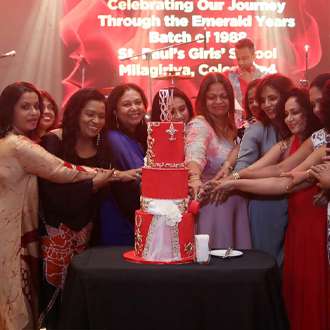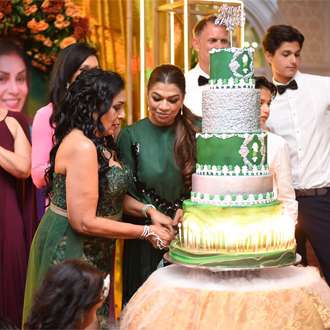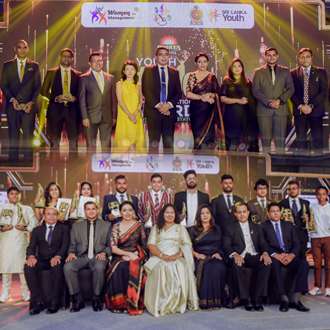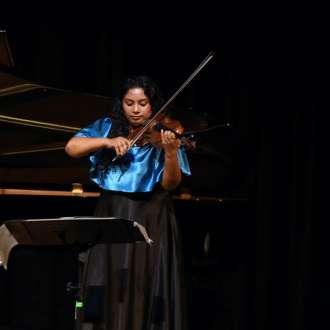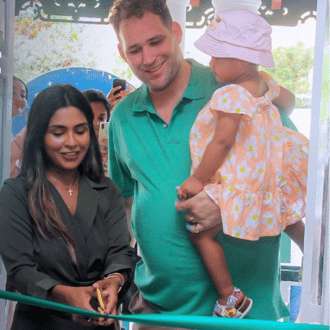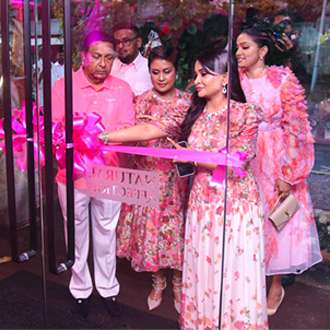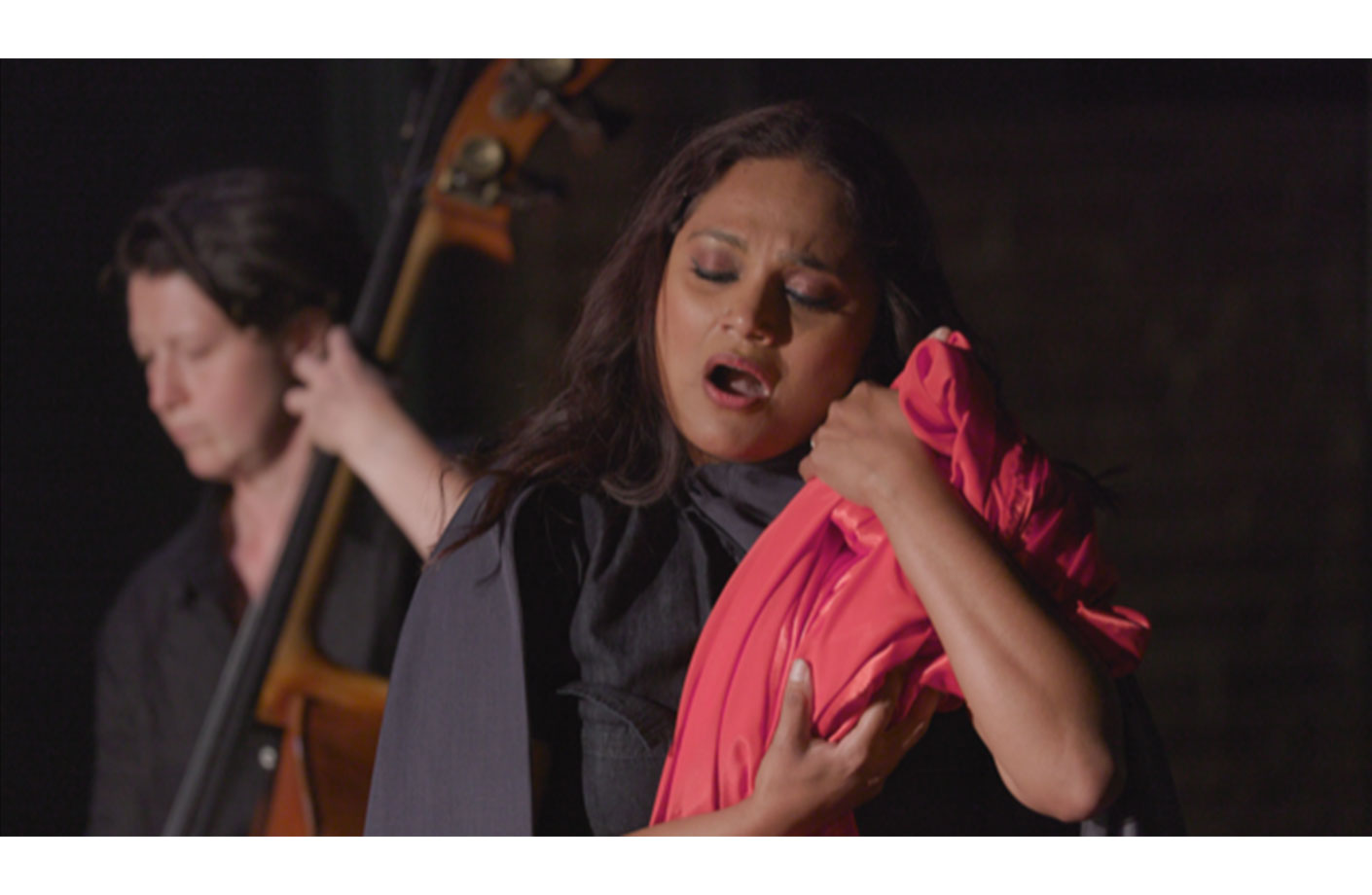
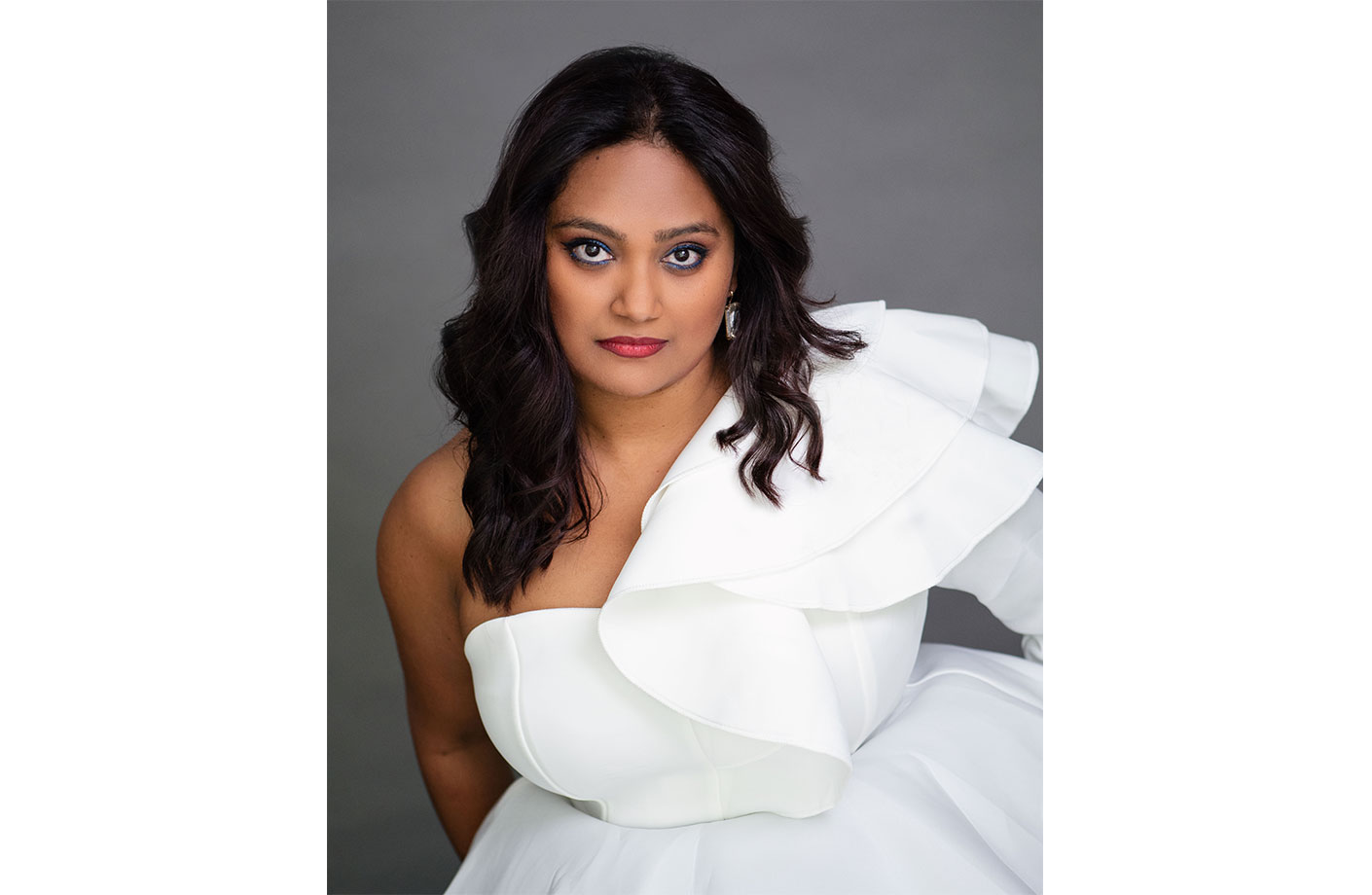

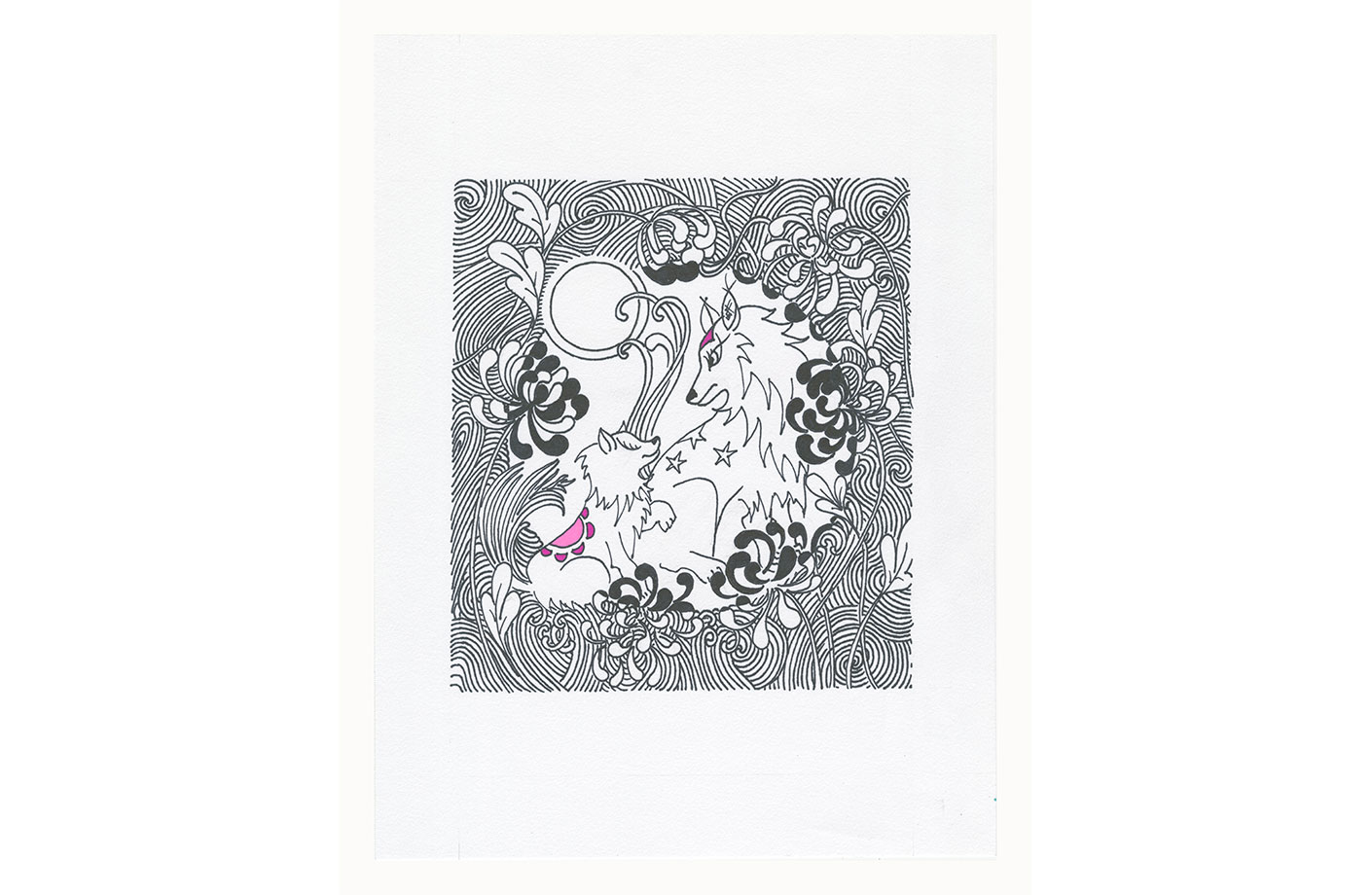
Tharanga Goonetilleke is a world-renowned soprano opera singer. Born in Badulla, Sri Lanka (though raised in Ratmalana), she has delighted audiences with her beautiful voice since she was a teenager. Tharanga became the first Sri Lankan woman to attend the renowned Juilliard School in New York City, one of the premier performing arts schools in the world, where she received a full-tuition scholarship. While at the School she obtained her Master of Music degree in Voice and Opera, as well as her Artist Diploma for Opera Studies (post-Masters).
Tharanga made her solo debut as a teenager with the Symphony Orchestra of Sri Lanka (SOSL) in 1998 while she was a student at Colombo’s C.M.S Ladies’ College, after having won the Concerto Competition organised by the SOSL. She decided to read a Bachelor of Music degree in the USA at Converse College (now Converse University), where she was the only recipient of the award ‘Distinction in Opera’ upon graduation. She also has a minor degree in biology.
Tharanga has won numerous awards in the USA, including the Makiko Narumi Memorial prize from the Juilliard School and the Regional level of The Metropolitan Opera National Council Auditions. She has also performed to great acclaim in Europe, Canada, India, Uganda, Vietnam and South Korea.
Tharanga, it's lovely to be able to talk to you today about your life and about issues close to your heart. First, though, let me take you back to when you first became interested in opera. I believe it was when you heard the New Zealand opera singer Dame Kiri Te Kanawa perform. Can you remember where you were and why her voice reached out to you?
The first western classical voice I ever heard was Ms Christine Perera’s. I was about 10 years old and she was the choir director at Ladies’ College where I went to school. Ms Christine’s voice was beautiful and she was a huge influence on my singing as a young aspiring musician. Hearing Dame Kiri Te Kanawa’s voice on a CD when I was around 12 was a game-changer for me because I knew that I could resonate with that type of singing naturally. It was an indescribable feeling.
I know that you trained with Christine Perera as a child. What influence do you think she has had on your life and musical career?
Ms Christine (as we called her at Ladies’ College) took me under her wing and encouraged me to sing solo in concerts and to take voice examinations conducted by various UK-based colleges. Most of all, she believed in me.
How old were you when you left Sri Lanka to study at Converse College in South Carolina? Did you find the move to be a culture shock?
I left for the USA after I finished my A/L exams at the college. I was 19. I don’t believe that I suffered that much of a culture shock but I may have been a bit of a shock to those in South Carolina! – I was the only Sri Lankan most of them had ever met. I was happy to share information about Sri Lanka and all that comes with it with everyone. But I missed my country of birth very much, and I still do.
You had at one point planned to study medical science in Sri Lanka. Could you imagine yourself with a different career today?
I never imagined that I could have a career in music. The sciences always seemed to be the obvious path for me as a kid. Even when went to Converse College I decided to study both biology and music because I wasn’t quite sure which path would suit me best. It was only when the time came for me to go for a Master’s degree that I found clarity as to which avenue I should take. The decision was made easier by being accepted to the Juilliard School with a full scholarship.
What in particular did you take from your time at Juilliard School in New York City?
Juilliard is located in the heart of Lincoln Centre where the best musicians arrive from all parts of the world to perform. Being in that environment with amazingly gifted, like-minded individuals from all walks of life alone is – to say the least – an inspiration. Apart from that, Juilliard has a concentration of the finest teachers and coaches in the whole world. I was under their tutelage for five years. That to me was everything.
Is the American opera world very different from Sri Lanka's?
Sri Lanka is just beginning to dip its feet into Opera and it wouldn’t be fair to compare.
You've tackled some phenomenal roles. Are there particular musical styles or characters you're more naturally drawn to, or do you enjoy the variety?
Professionally, I sing strictly Operatic music. I don’t do fusions, musical theatre or pop except at home, for fun. Within the Operatic repertoire, there’s plenty of variety. I sing a range of styles from Baroque music to Mozart to 19th-century Romantic music to Contemporary classical repertoire. I would say that I'm naturally most drawn to Mozart and modern contemporary music, depending on the composer.
Which performances/recordings are you most proud of, and why?
It is difficult to pick out a few, though I would say that my Alice Tully Hall debut performance of Carmina Burana was certainly memorable. Also, my New York City Opera debut as Resi from Intermezzo was special, simply because I was in awe of the fact that I was standing on a stage where the greatest artists of all times once stood; it was surreal. As for the most satisfying roles to perform, Mimi (from La Bohème) and Blanche (from The Dialogues of the Carmelites) are very dear to my heart.
Do you believe that opera is to be experienced, interpreted and discussed rather than just heard? I mean, do you view singing opera as a form of storytelling?
Opera is nothing if it's not storytelling. No matter how amazing your vocal technique may be, if you can’t move the audience with your storytelling it is not Opera at all. No two singers ever experience or interpret an Opera role the exact same way. That’s the beauty of this art. Digging into the characters, the words, and the story is a large part of the job of an Opera singer.
There’s a general feeling among some sections of the public that opera is intimidating and difficult. Do you agree there’s a problem here? Do we need to make it more approachable to the younger generation today?
Opera is timeless when it comes to music and it has very relatable emotional content, no matter when it was written. However, Opera directors of all generations have artistic freedom to introduce more contemporary interpretations and update clothing choices etc, to allow for a more relatable visual language to the audiences. That has been the case for years and it continues to be so today.
Is it intimidating? I certainly hope not because, as an industry, we welcome everyone to the Opera. I would say: go check out an Opera if you have an opportunity. Go with an open mind and don’t be swayed by what others say about this art form. Decide for yourself what you think of the experience.
On a more personal note, so that our readers get acquainted with the woman behind the incredible voice, please tell us a bit about you as a person.
What are your main interests besides opera?
I draw, paint, write poetry, I'm curious about languages, I love being a mother and I teach music. None of these are hobbies. In fact, they feed each other and contribute to my singing and to me as a person as a whole. In fact, this year I was on the faculty of the ‘Summer with Juilliard’ programme and, in addition to teaching voice lessons, I taught a class on expressing music through visual arts.
Are you interested in beauty and fashion trends?
I can’t say that I am. But I am interested in clothing that works for different body types and personalities, no matter what size or shape one might be.
You’re also a visual artist, taking after your mother. Was there a specific moment when you thought ‘I want to be an artist’ or was it a more gradual process that brought you to where you are today?
I have been painting and drawing for as long as I can remember, and I was singing since I was a baby. I prefer not to choose to be any one thing, even professionally, although the world loves labels like ‘Opera singer’, ‘Visual Artist’, ‘Teacher’ etc. But to me, they are all one.
Where do you find inspiration for your artwork?
I am easily inspired. Anything from the ordinary or extraordinary can be looked at with fresh eyes. It’s all about perspective and openness.
How do you manage to maintain a balance between your roles as an opera singer and as an artist?
I don’t have to balance them. It is simply a medium switch. I express myself with my voice when I sing, and with paints when I draw or paint. The important thing is to stay organised and manage your time in a way that you can continue to grow your skillset. For example, in the last year, I illustrated ‘The Jungle Book’ for the Glimmerglass Festival, and at the same time worked on my vocal repertoire for upcoming performances. To me, it's really about being in the present. When I am doing my visual artwork, I am fully present and engaged in that; when I am singing, I am completely invested in that.
I understand that you’ve had an extraordinary summer this year. Can you please give our readers a summary of that?
Yes, this summer I felt that I was able to live my artistic self to the full. First, The book I illustrated for the Glimmerglass Festival ended up being the inspiration for the stage production of the Opera ‘The Jungle Book’ By Kamala Sankaram and Kelley Rourke which was shown at Glimmerglass this summer. It was amazing to see the characters I drew come to life at the hands of amazing designers.
Secondly, I was honoured to be on faculty for ‘Summer with Juilliard’, where I was able to join other teachers who are also primarily Juilliard graduates to teach young musicians. It was an amazing experience, to say the least.
Thirdly, I performed in a world premiere of the Opera ‘Letters That You Will Not Get: Women's Voices from the Great War’, by Kirsten Volness, Kate Holland and Susan Werbe. It’s a 6-women show and I was one of the women who brought to life letters written by women all over the world during World War I. Having grown up in Sri Lanka during the war, singing this role was quite personal as well as being, I felt, therapeutic.
This in a nutshell was my last three months!
Experience Tharanga’s beautiful voice here:
https://www.youtube.com/watch?v=HgbbBfUCZAw
For more information:
https://www.tharangagoonetilleke.com/
Photos: Ryan Lash, Erica Moffitt and Emitha LLC (@emithastudios)/Christopher Smith
